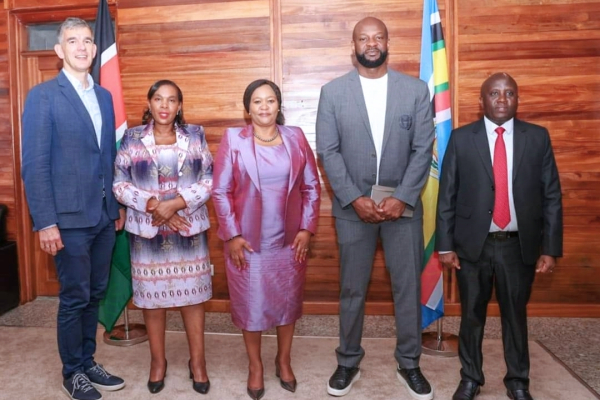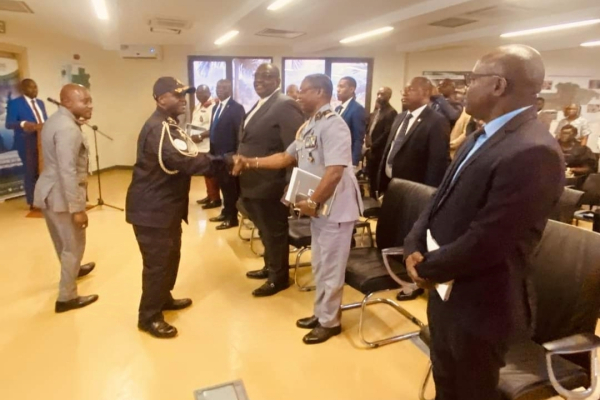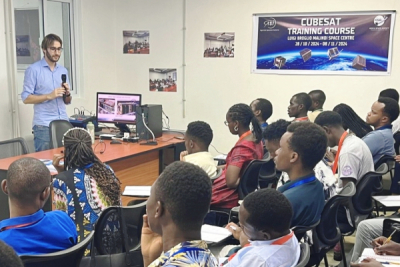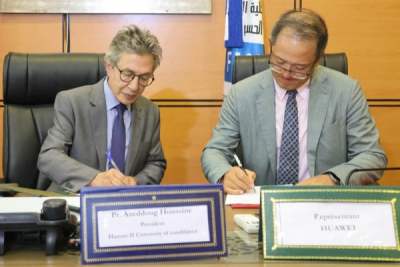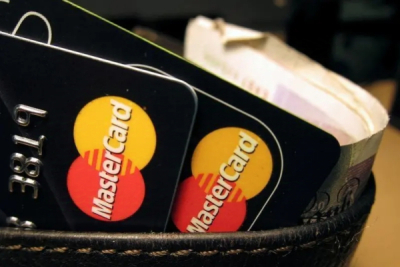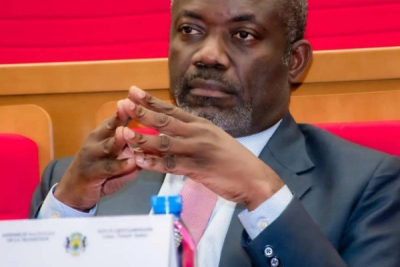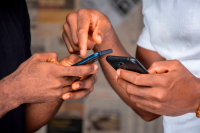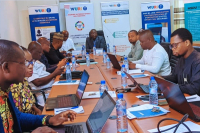
Tech (802)
With Africa’s digital economy rapidly expanding, partnerships like this play a crucial role in bridging the digital skills gap. By integrating AI into data-driven decision-making, such collaborations can produce solutions uniquely suited to local challenges.
Kenya has announced a new collaboration with Google to bolster the nation's digital infrastructure and expand digital skill development for citizens. In a meeting held yesterday October 29 with Google’s President for Europe, Middle East, and Africa, Matt Brittin, Kenya’s Cabinet Secretary for Information, Communication, and the Digital Economy, Dr. Margaret Ndung'u, and Cabinet Secretary for Tourism and Wildlife, Hon. Rebecca Miano, discussed the ambitious partnership, which will center on leveraging artificial intelligence (AI) and digital tools to support key sectors.
Key objectives of the partnership include strengthening Kenya's cybersecurity and empowering locals with digital skills. Google’s technology will support Kenya’s tourism industry by using AI-powered data insights to enhance conservation efforts, attract international visitors, and improve digital experiences for tourists.
This collaboration supports Kenya’s Vision 2030 goals of creating a secure and inclusive digital landscape, unlocking innovation and economic growth opportunities. It also aligns with Kenya's Digital Economy Blueprint, which aims to ensure universal digital access and engagement, positioning the country as a leader in digital transformation within Africa. Furthermore, the United Nations Economic Commission for Africa (UNECA) projects in its Artificial Intelligence in Africa: Economic Development Potential and Challenges to Overcome 2024 report that the adoption of AI could add nearly $150 billion to the continent's GDP by 2030.
The initiative underlines Kenya’s commitment to a digitally-driven economy, setting a foundation for long-term growth and enhanced global connectivity.
Hikmatu Bilali
In response to contemporary security challenges, many countries are turning to advanced technologies to enhance their protection. Gabon is following suit and committing to this approach to secure its territory effectively.
Gabon plans to establish a National Territorial Surveillance System (SNST) supported by satellite technology to strengthen national security through space-based solutions. The project was discussed on October 29 at a workshop organized by the Gabonese Agency for Space Studies and Observations (AGEOS), under the guidance of Bonjean Rodrigue Mbanza, Minister of Digital Economy and Information Technology.
"The idea is to provide defense and security forces with technological tools for optimized management of the country's security. Additional resources are being acquired to bolster maritime and land security," explained Aboubakar Mambimba, Director General of AGEOS.
The project represents a shift toward modern surveillance methods, moving away from traditional approaches. It responds to rising cross-border crime, including maritime piracy, poaching, and environmental offenses. National security has been a strategic priority for transitional President Brice Clotaire Oligui Nguema.
The SNST would combine satellite imagery with AI-powered analysis for real-time territorial monitoring. Automatic alerts and drones for close-range tracking would allow security forces to respond swiftly to threats, enabling coordinated interventions. A centralized database would track trends and support strategic planning against illicit activities.
If implemented, this system could significantly reduce security risks nationwide. Beyond protecting national sovereignty, it could also aid ecosystem conservation, supporting efforts against deforestation and wildlife trafficking. Through this project, Gabon aims to assert its leadership in space-based security and environmental preservation in Central Africa.
Samira Njoya
Kenya aims to accelerate the development of its space industry, viewing it as a key driver of socioeconomic progress. The country’s first Earth observation satellite, designed and built by local engineers, was launched in April 2023.
The Kenya Space Agency (KSA) announced on Monday, October 28, the launch of a training program focused on nanosatellite (CubeSat) development, in partnership with the Italian Space Agency (ASI). The program, which runs through November 8, is led by ASI industry experts and professors from the University of Rome “La Sapienza.”
Thirty participants, including students and KSA technical staff, are benefiting from the hands-on training, which aims to bridge the technology gap and enhance Kenya’s capabilities in space science and technology.
“This Cubesat Training Course is aimed to benefit the participants by equipping them with essential skills and experience in satellite development. The course is intended to bridge the technology gap and help Kenya develop its indigenous technical capabilities to drive future advancements in space science and technology,” the KSA stated.
The initiative builds on an online training program held from July 22 to August 16, 2024, which provided theoretical knowledge on nanosatellite development. That program was organized by KSA and the U.S.-based company Teaching Science & Technology, Inc. (TSTI).
The training aligns with KSA’s strategic plan for 2023-2027, which aims to foster Kenya’s emerging space economy and contribute to national socioeconomic development.
By empowering Kenya to build its own nanosatellites, the program is expected to further the country’s space ambitions. In April 2023, Kenya launched its first operational Earth observation satellite, Taifa-1, which was designed and developed by a team of Kenyan researchers. Taifa-1 supports various sectors, including agriculture, food security, natural resource and disaster management, and environmental monitoring.
Isaac K. Kassouwi
Morocco is actively investing in its digital transformation, with a strong focus on developing human resources. This strategic approach includes updating educational programs to incorporate digital skills.
Huawei Morocco, a subsidiary of the Chinese tech firm Huawei, and Hassan II University of Casablanca (UH2C) recently signed a partnership to launch "Code 212," a digital skills center. Already established in other Moroccan universities, this center aims to provide students with targeted training in key fields such as artificial intelligence, cloud computing, big data, and the Internet of Things (IoT).
"This project embodies our commitment to education and innovation, and we are confident it will play a crucial role in training future tech leaders. Through this meaningful collaboration, Huawei Morocco seeks to promote high-quality, forward-looking training to shape the experts who will drive Morocco's digital transformation," stated Jason Chen, Vice President of Huawei Morocco.
The initiative aligns with the Esri 2030 Pact, Morocco's national plan to accelerate the transformation of higher education, scientific research, and innovation by 2030. Its objective is to equip students with personal, transversal, and digital skills tailored to labor market demands, in line with royal directives to keep pace with global digital growth.
The rollout of "Code 212" is particularly significant given the current push for digitalization as a core driver of economic growth, while training remains a major challenge. A study by Boston Consulting Group (BCG) highlights the need for Africa to train 650 million people in digital skills by 2030 to fully leverage technological advancements. In Morocco, the government has set an annual target to train 100,000 young people in digital professions, aiming to create 240,000 jobs in the sector by 2030.
Samira Njoya
While digitalization is on the rise in Africa, mobile money remains underutilized as a payment method across many service platforms. The collaboration between telecom operators and banking solutions leaders is a promising step forward.
Mastercard and Orange Middle East and Africa (OMEA) announced a strategic partnership on Tuesday, October 29, that will enable millions of Orange Money wallet holders to instantly obtain a virtual or physical debit card linked directly to their Orange Money account starting in 2025. These cards will allow Orange Money users to make seamless payments locally and internationally with any merchant, website, or mobile app that accepts Mastercard.
The new service will initially roll out in Cameroon, the Central African Republic, Guinea-Bissau, Liberia, Mali, Senegal, and Sierra Leone. According to Aminata Kane, CEO of Orange Money for the Middle East and Africa, “by giving [...] users the ability to make easy payments with the Mastercard virtual card, we open the door to a world of new possibilities and promote their financial independence.”
Amnah Ajmal, Executive Vice President of Market Development for Mastercard EEMEA, noted that this collaboration with Orange Money “marks a crucial step in unlocking the full potential of digital financial services in Africa, enabling millions to participate in the global economy.”
The African Digital Banking Transformation Report 2023 (by African Banker and Backbase) highlights that the banking rate among sub-Saharan Africa’s adult population was 48% last year, marking the region as having one of the lowest levels of financial inclusion. Once extended to Orange’s 17 affiliates across Africa and the Middle East, the Mastercard-Orange MEA partnership promises to open up new financial possibilities for 37 million active Orange Money subscribers.
Mastercard’s expertise in secure payment gateways, combined with its local market knowledge and tailored solutions for small and medium-sized enterprises (SMEs), ensures that this partnership has the potential to transform how millions access financial services and participate in the digital economy.
Customers eager to try the new service will be able to request a virtual debit card via Orange’s Max it super app and pick up a physical card at Orange Money Mastercard locations.
Digitalization has become an essential tool for enhancing service efficiency and attracting investment. By modernizing key sectors, governments aim to drive growth and ensure optimal resource management.
Gabon's Ministry of Mines and the Ministry of Digital Economy on Friday announced a strategic partnership to create a unified digital platform for managing mining activities across the country. The platform will be used to map, monitor, and regulate all mining operations.
"This agreement aims to develop local, customized solutions for managing mining permit allocation and utilization, avoiding the high costs of outsourcing. Gabon possesses the necessary skills, staff, and knowledge to undertake this task,” said Mines Minister Gilles Nembe (photo).
This initiative is part of the transitional government’s digitalization program, aimed at modernizing key sectors to enhance their attractiveness and diversify the economy. According to the African Development Bank (AfDB), the mining sector contributed around 5% of Gabon’s GDP, 7% of employment, and 9% of exports in 2022, making it a central pillar of the national economy.
The upcoming digital platform will centralize and standardize mining permit management, simplifying information access for investors. It will feature online services such as permit applications, electronic payments, and the management of renewals, transfers, and extensions of permits. These features will provide mining sector stakeholders with simplified, secure access to administrative services, fostering a more transparent and efficient business environment.
Beyond boosting the sector’s appeal to private investors, this digital transformation is expected to improve governance of Gabon’s natural resources and enhance data management efficiency, meeting the growing need for transparency and resource control.
Samira Njoya
Mandating tax compliance verification for mobile devices could increase tax revenue collection and reduce economic losses from illicit device imports. Counterfeit devices are often less secure and more vulnerable to cyber threats. Requiring a database of verified, tax-compliant devices can improve device authenticity and network security for end-users.
The Communications Authority of Kenya (CA) has instructed mobile network operators to connect devices only after verifying their tax compliance, according to a public notice posted on its X page on October 24. This directive, effective from November 1, 2024, requires operators to consult a Kenya Revenue Authority (KRA) database of compliant devices, ensuring that only tax-compliant phones are connected to their networks.
Under these new regulations, local device assemblers, importers, retailers, and wholesalers must upload the International Mobile Equipment Identity (IMEI) numbers of all mobile phones into a KRA-provided portal. All devices connected to networks before October 31, 2024, are exempt from these rules. Starting January 1, 2025, the KRA will track all locally assembled and imported devices to maintain tax compliance.
Operators will also have to implement a “gray-listing” system for non-compliant devices, granting a limited period for tax regularization. If compliance isn’t met, the devices will be blacklisted. Retailers and wholesalers are similarly required to verify the tax status of devices before sale, and the CA will provide a verification mechanism for end-users.
These measures are part of Kenya’s ongoing efforts to ensure regulatory compliance in the telecommunications sector, strengthen the National Master Database on Tax-Compliant Devices, and address device-related security and network integrity.
A study conducted by Kenya's Anti-Counterfeit Authority between October 2019 and February 2020 revealed that the energy, electrical, and electronics sector including mobile devices was the second most impacted by counterfeiting, accounting for 14.67% of the Kes 153.1 billion ($1.18 billion) the government lost in revenue in 2018. This poses risks not only to users but also to network integrity and security. Counterfeit devices are often less secure and more vulnerable to cyber threats. By requiring a database of verified, tax-compliant devices, the CA aims to improve device authenticity and network security for end-users.
Hikmatu Bilali
The lack of support is a key factor in the failure of many African startups. This includes inadequate regulatory policies, insufficient access to funding, lack of proper infrastructure, and a shortage of training programs.
The government of Zanzibar recently announced the launch of a national blockchain-based sandbox program. This initiative aims to provide startups with a secure environment where they can test and refine their technologies before deploying them on a larger scale.
The project, developed in partnership with the UAE-based company LedgerFi IT Solutions and powered by the XinFin XDC blockchain network, aspires to position Zanzibar as a regional hub for technological innovation. “The primary objective is to create a conducive environment for the development of cutting-edge technologies including blockchain, artificial intelligence, and other emerging solutions. We are committed to collaborating with startups that will help us achieve our digitization objectives,” stated Seif Said, Director General of Zanzibar's e-Government Authority.
Startups participating in the sandbox will receive specialized technical training, including blockchain usage, enhancing their skills in security, data management, and regulatory compliance. Selected companies will also gain access to technology enhancement programs to boost their competitiveness. Additionally, they will have the opportunity to collaborate with industry experts and receive mentorship from industry leaders.
This initiative aligns with a broader trend of supporting innovation across Africa, where startups often face regulatory hurdles and market entry challenges. According to a 2023 Deloitte report, startups involved in sandbox programs experience a 30% reduction in time-to-market due to a framework that encourages experimentation and adaptability. Furthermore, the survival rate of young companies is significantly higher in such environments.
For Zanzibar, this initiative is a strategic opportunity. By offering a controlled experimental environment and a flexible regulatory framework, the sandbox will not only mitigate innovation-related risks but also strengthen public-private partnerships. It is expected to attract foreign investment and stimulate growth in the local tech sector, thereby positioning Zanzibar as a key player in Africa’s digital ecosystem.
Samira Njoya
In Africa, many people are unable to access essential rights like education, healthcare, and social protection due to low birth registration rates. New technologies offer a promising solution to this challenge.
The World Bank, through its West Africa Unique Identification for Regional Integration and Inclusion (WURI) Project, has officially handed over 2,050 mobile terminals to Benin's National Agency for Personal Identification (ANIP). This initiative aims to enhance the electronic registration of civil status events, including births, marriages, and deaths, ensuring better social inclusion and improved tracking of these events within the country.
"These 2,050 terminals will significantly strengthen our capacity to modernize civil registration in Benin and ensure that every child is automatically registered in the National Register of Physical Persons (RNPP) at birth. These devices will also improve the reliability of collected data, which will be directly integrated into our national databases," stated Aristide Guy Adjinacou Gnahoui, Director General of ANIP.
This project is part of the WURI initiative, which spans West Africa and aims to enhance inclusion through a reliable and universal identification system. Specifically, the initiative targets identifying 100 million individuals across West Africa by 2028, representing 27% of the ECOWAS population. This effort comes as the continent continues to face identification challenges. According to World Bank data from 2017, nearly 40% of births go unregistered in Sub-Saharan Africa, making it difficult for children to access essential services.
By distributing these terminals, the WURI-Benin project addresses an urgent need, making registration more accessible, particularly in rural areas and across public and private healthcare facilities nationwide. The goal is to facilitate the systematic declaration of births and improve the reliability of civil status data to better plan public policies and strengthen social services.
Kenya is at a very important point in its digital transformation. If the needed changes are made, the digital sector could be a big part of the country's economic growth.
Kenya's digital economy is projected to contribute a substantial 662 billion Kenyan shillings (approximately $5.13 billion) to the country's GDP by 2028, according to a new report.
The report, titled "Driving Digital Transformation of the Economy in Kenya," was presented to Kenyan authorities by the GSM Association (GSMA) on Tuesday. It explains that this growth will be largely driven by digital transformation in key sectors such as agriculture, manufacturing, transportation, and commerce.
The impact of this digital momentum will extend beyond GDP growth. The report estimates that these reforms will create 300,000 new jobs and increase tax revenues by 150 billion shillings. These efforts align with President William Ruto's "Kwanza" program, which prioritizes the digital economy to diversify revenue sources and boost job creation, particularly for Kenya's youth. The potential of digitalization is seen as crucial for enhancing productivity, especially in rural areas, and addressing challenges posed by population growth.
Barriers to Digital Adoption
Despite these promising prospects, the GSMA report points out several obstacles hindering the widespread adoption of digital technologies in Kenya. A significant challenge is the gap between network coverage and actual mobile internet usage. While 99% of the population has access to 3G and 98% to 4G, only 33.5% of Kenyans actively use mobile internet. This digital divide limits the full integration of digital services into the national economy.
High costs of devices and connectivity, along with a lack of digital skills among the population, are identified as the main barriers to broader adoption. To address these issues, the report calls for bold policy measures aimed at reducing these costs, boosting demand, and encouraging further investment in digital infrastructure.
Samira Njoya
More...
The digital revolution in Africa is happening fast and is making big changes in many different areas. This shift is trying to improve the quality of services given to people, whether in education, healthcare, government, or infrastructure.
The Guinean National Transitional Council (CNT) approved a €66 million credit agreement on Wednesday, October 23, with French investment bank Bpifrance. The loan is aimed at supporting the country’s digital transformation. Specifically it focuses on the shift from analog to digital radio and televiso.
The project includes the installation of Digital Terrestrial Television (DTT), modernization of the radio network, the construction of five regional studios by Thomson Broadcast, and the digitization of the country’s audiovisual archives. The goal is to ensure better broadcast quality for the population, providing high-definition services while preserving Guinea’s audiovisual heritage through a comprehensive digitization of historical content, including films, radio and television programs, and audio and video recordings.
This initiative aligns with Guinea’s commitments to the International Telecommunication Union (ITU) for digital migration, a transition that has been anticipated for nearly two decades. The agreement, signed on June 25, consists of two main components: a direct loan of €25 million from the French Treasury and a private loan of €31 million guaranteed by Bpifrance Assurance Export.
The allocated funds will also help equip major Guinean cities with autonomous production and broadcasting facilities. The National Audiovisual Institute (INA) will be responsible for the digital preservation of the country’s audiovisual archives, thus contributing to the promotion of Guinea’s cultural heritage.
This initiative is strategically important for Guinea, not only in terms of modernizing media infrastructure but also in enhancing access to information and creating new economic and employment opportunities in the media and audiovisual production sector.
Samira Njoya
In recent years, Gabon has emerged as a leader in Central Africa's digital sector, showcasing impressive advancements. The country is now focused on leveraging this progress to establish itself as a frontrunner in digital transformation across the continent.
Gabon is set to take a crucial step in its digital transformation with the launch of the Gabon Digital project, scheduled for November 7. Announced during the steering committee’s first session on Tuesday, October 22 in Libreville, the initiative aims to leverage digital technologies to boost the country's economic competitiveness and enhance administrative transparency.
The project is backed by an initial loan of 44 billion CFA francs (approximately $72.4 million) from the World Bank and focuses on several key areas. These include improving social aid management through the implementation of a unified social registry, securing data with the construction of a state-of-the-art data center, establishing a cybersecurity incident response center, digitizing civil registration systems, and introducing a digital payment system.
This initiative is part of the National Transition Development Plan (PNDT) 2024-2026, in which digital transformation plays a central role. It is also linked to other programs like eGabon, which aims to strengthen the healthcare system to improve access to medical services and promote equitable healthcare for all Gabonese citizens.
For nearly five years, the digital sector's contribution to Gabon's economy has remained around 5% of GDP. However, authorities are targeting an increase to 10-12% by 2025. The Gabon Digital project is seen as a key driver to accelerate this growth by maximizing the impact of digital solutions on the national economy.
Beyond modernizing the administration and promoting transparency, the project is expected to stimulate the emergence of new business sectors and create jobs in the digital domain. Additionally, it aims to diversify Gabon’s economy, which remains heavily reliant on the oil sector, laying the foundation for more sustainable and resilient development.
Samira Njoya
Intra-African trade encounters numerous obstacles, including the absence of a unified payment system. The adoption of Papss addresses these challenges by streamlining payment processes and reducing dependence on foreign currencies, thereby promoting increased trade within Africa and enhancing economic integration.
Kenyan President William Ruto has called on commercial banks to expedite their adoption of the Pan-African Payments and Settlement Systems (Papss), urging them to transition away from using the U.S. dollar for intra-African trade. The president revealed this at the launch of the Micro, Small and Medium Enterprises Accelerator programme at the Kenyatta International Convention Centre, Nairobi, on Wednesday, October 16.
Ruto emphasized the need to reduce transaction costs on the continent, which currently result in Africa losing over $5 billion annually. “With Papss, we can conduct transactions in our local currencies, significantly lowering exchange rate challenges and reducing transaction costs for businesses across Africa,” he noted, further encouraging banks to sign on to the system to enhance regional trade.
Raimond Molenje, acting CEO of the Kenya Bankers Association, confirmed that the association is actively working with the Central Bank of Kenya to implement a national switch to the Papss system, which would facilitate smoother trade with neighboring East African countries. This development aligns with Papss's goal of creating a single market for Africa and increasing intra-continental trade.
Papss, which was introduced by the African Continental Free Trade Area (AfCFTA) in 2019, facilitates seamless payments in local currencies across African nations. Initially piloted in the West African Monetary Zone, it was formally rolled out by Afreximbank in September 2021, with full operations beginning in early 2022.
The AfCFTA creates a single market for goods and services, allowing Kenyan businesses to access a market of over 1.3 billion people and a combined GDP of over $3.4 trillion. This significantly expands their customer base and revenue potential.
Hikmatu Bilali
Investing in digital infrastructure positions Africa for significant economic advancement by opening up opportunities for e-commerce, tech startups, and improved public services. Governments can leverage this trend to create jobs for its population
Governor Hyacinth Alia of Benue State signed a Memorandum of Understanding (MoU) with EVNT Technologies, a leading Saudi Arabian IT firm, aimed at transforming the state's digital landscape. The signing took place during the 2024 GITEX Global Summit in Dubai which ended on October 18.
The governor highlighted that this initiative “is a critical step towards realizing our vision of a truly digital Benue. It is about creating opportunities, empowering our people, and laying the groundwork for sustained economic growth."
Through the Benue Digital Infrastructure Company PLC (BDIC), the partnership will focus on expanding digital infrastructure, skills training, and digital policy development.
Hamad Al Saleh, founder of EVNT Technologies, expressed enthusiasm for making Benue a model for digital transformation in Nigeria. The implementation is expected to begin within 90 days, focusing on infrastructure development, capacity building, and digital innovation.
This move aligns with the National Digital Economy Policy and Strategy 2020 – 2030 (NDEPS), which aims to “transform the country into a leading digital economy providing quality life and digital economies for all.” Benue, by becoming a model for digital transformation, can leverage this trend to create jobs for its population.
Hikmatu Bilali


